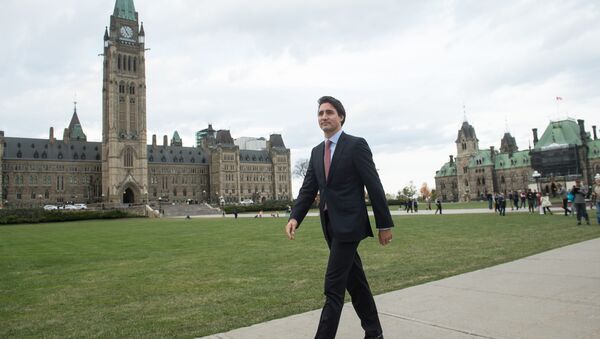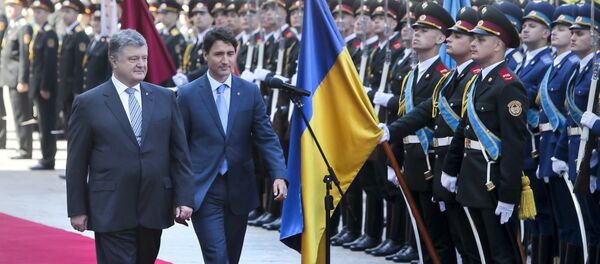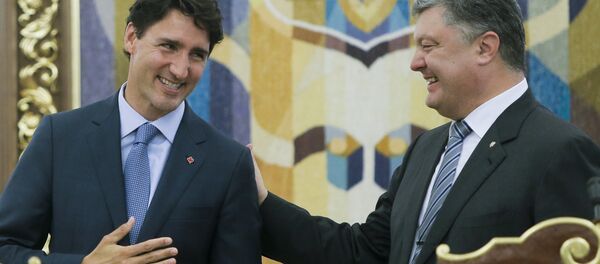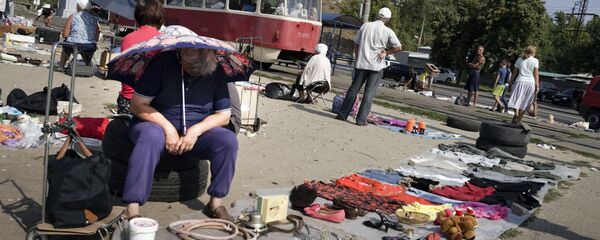On Monday, the Canadian prime minister paid a visit to Ukraine for the first time. The visit featured many photo opportunities, and the signing of a Canada-Ukraine free trade deal. At the same time, Mr. Trudeau could not reassure Kiev that Canada's 200 military trainers would stay in the country after 2017, when their existing deployment runs out.
According to Globe and Mail senior international correspondent Mark MacKinnon, the visit confirmed that even though Ottawa would not stray from its course supporting Ukraine's post-Maidan government, it would soften its tone toward Moscow.
"Gesture-wise, Prime Minister Justin Trudeau's first visit to Ukraine was exactly what his hosts wanted to see," the journalist recalled. "In terms of substance, however, the message to President Petro Poroshenko's government was that Canada is considering a step back from its all-in position of supporting Kiev, in favor – perhaps – of a defrost in relations with Russia," he added.
Official welcome in Kyiv – thank you President @Poroshenko for your hospitality. pic.twitter.com/MdrE0NVbPO
— Justin Trudeau (@JustinTrudeau) 11 июля 2016 г.
Grateful to @JustinTrudeau and Canadian people for their constant support. We value greatly political, economic and humanitarian assistance
— Петро Порошенко (@poroshenko) 11 июля 2016 г.
Trudeau, MacKinnon wrote, visited all the right places (including the Holodomor Memorial and Kiev's Maidan Square), "politicized memorials that commemorate the Ukrainian nation as the victim, and governments in Moscow as the aggressor." The stopovers, the journalist pointed out, "were meant to show that his sympathies lie in the same place as his predecessor Stephen Harper's."
Visiting the Maidan as Canada reaffirms its support for the Ukrainian people & their sovereignty. pic.twitter.com/KidDLxIh6v
— Justin Trudeau (@JustinTrudeau) 11 июля 2016 г.
"Mr. Harper," MacKinnon recalled, "told Russian President Vladimir Putin face-to-face 'you need to get out of Ukraine', and said in separate remarks that he didn’t see potential for cooperation with Russia so long as Mr. Putin was leader of the country."
Trudeau's comments were more measured, the journalist added. While emphasizing Canada's "continued steadfast support" for Kiev, and criticizing Russia for not being a "positive partner" in the Minsk ceasefire agreement on peace in Donbass, his comments weren't outright belligerent.
Ultimately, the journalist suggested, "the lack of angry words directed at Moscow seemed just as important as what was actually said and signed. Mr. Trudeau also appeared to duck the question when he was asked by Mr. Poroshenko to extend the Canadian military's training of Ukrainian troops beyond the current mission end date of March 2017," saying "he would need to consult with Canada's allies on the point."
At any rate, one of the biggest problems faced by Western leaders in relation to their post-Maidan Ukrainian colleagues relates to the country's ongoing political and military crisis, its economic decline, and the apparent complacency Petro Poroshenko and his allies among the country's lawmakers have exhibited towards the all-encompassing plague of corruption.
In a frank and straightforward analysis of Washington's troubles with their wayward allies, political commentator and retired US Navy Admiral James Lyons warned that Ukraine has been overrun with a "culture of impunity" and corruption, which threatens to "send Ukraine back into the Russian orbit." In his op-ed for The Washington Times, Lyons noted, paraphrasing Reuters' journalist Josh Cohen, that Ukraine today faces "corruption…so bad, a Nigerian prince would be embarrassed."
What's worse, the officer added, "President Poroshenko himself appears to be more part of the problem than part of the solution. Western governments keep urging him to make reforms that would wrest Ukraine from the grasp of oligarchs, evidently forgetting that he's an oligarch."
"When it explodes," he noted, "only Vladimir Putin will be ready to pick up the pieces."
In this light, the Canadian prime minister's softened rhetoric toward Moscow seems only logical. What good is there in putting all your eggs in one basket in Kiev, when that basket is quickly turning into a socio-economic basket case ready to explode at any moment?




